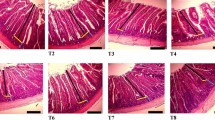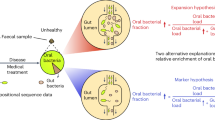Abstract
BLOAT (tympanites) in ruminants is characterized by distension of the forestomachs following interference with the normal elimination of gas produced by the microbial digestion of food in those organs. Bloat occurs in cattle usually when fresh legumes are fed, but it may also develop when high-grain rations are supplied in the feed. Many hypotheses have been put forward to explain the ailment, but all have been inadequate in view of its variable nature1. Not all animals bloat readily and not all legume pastures produce bloat in susceptible animals.
This is a preview of subscription content, access via your institution
Access options
Subscribe to this journal
Receive 51 print issues and online access
$199.00 per year
only $3.90 per issue
Buy this article
- Purchase on Springer Link
- Instant access to full article PDF
Prices may be subject to local taxes which are calculated during checkout
Similar content being viewed by others
References
Johns, A. T., N. Z. J. Sci. Tech., A, 36, 289 (1954).
Coleman, G. S., Symp. Soc. Gen. Microbiol., 13, 298 (1963).
Becker, E. R., Quart. Rev. Biol., 7, 282 (1932).
Usuelli, F., Wiss. Arch. Landw., 3, 4 (1930).
Clarke, R. T. J., J. Gen. Microbiol. (in the press).
Author information
Authors and Affiliations
Rights and permissions
About this article
Cite this article
CLARKE, R. Role of the Rumen Ciliates in Bloat in Cattle. Nature 205, 95–96 (1965). https://doi.org/10.1038/205095b0
Published:
Issue Date:
DOI: https://doi.org/10.1038/205095b0
Comments
By submitting a comment you agree to abide by our Terms and Community Guidelines. If you find something abusive or that does not comply with our terms or guidelines please flag it as inappropriate.



